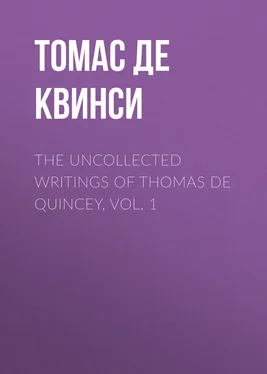On the memorable inaugural day of the Liverpool railroad, when Mr. Huskisson met with so sad a fate, a snipe or a plover tried a race with Sampson, one of the engines. The race continued neck and neck for about six miles, after which, the snipe finding itself likely to come off second best, found it convenient to wheel off, at a turn of the road, into the solitudes of Chat Moss.
The description of Apollo in wrath as νυκτι εοικω, like night, is a doubtful case. With respect to the shield of Achilles, it cannot be denied that the general conception has, in common with all abstractions (as e. g. the abstractions of dreams, of prophetic visions, such as that in the 6th Æneid, that to Macbeth, that shown by the angel Michael to Adam), something fine and, in its own nature, let the execution be what it may, sublime. But this part of the Iliad , we firmly believe to be an interpolation of times long posterior to that of Homer.
But the Odyssey , at least, it will be said, is not thus limited: no, not by its subject; because it carries us amongst cities and princes in a state of peace; but it is equally limited by the spirit of manners; we are never admitted amongst women, except by accident (Nausicaa)—by necessity (Penelope)—or by romance (Circe).
The other five were Homer, Virgil, Horace, Aristotle, Cicero.
Viz. the supposed dragging of Hector three times round Troy by Achilles—a mere post-Homeric fable. But it is ludicrous to add, that, in after years—nay, when nearly at the end of his translation of the Iliad , in 1718—Pope took part in a discussion upon Homer's reasons for ascribing such conduct to his hero, seriously arguing the pro and con upon a pure fiction.
'In the steamboat!' Yes, reader, the steamboat. It is clear that there was one in Homer's time. See the art. Phæacian in the Odyssey : if it paid then, à fortiori six hundred years after. The only point unknown about it, is the captain's name and the state-cabin fares.
'In arts,' we say, because great orators are amongst his heroes; but, after all, it is very questionable whether, simply as orators, Plutarch would have noticed them. They were also statesmen; and Mitford always treats Demosthenes as first lord of the treasury and premier. Plutarch records no poet, no artist, however brilliant.
'Umbratic.' I have perhaps elsewhere drawn the attention of readers to the peculiar effects of climate, in shaping the modes of our thinking and imaging. A life of inertia , which retreats from the dust and toil of actual experience, we (who represent the idea of effeminacy more naturally by the image of shrinking from cold) call a chimney-corner of a fireside experience; but the Romans, to whom the same effeminacy more easily fell under the idea of shrinking from the heat of the sun, called it an experience won in the shade; and a mere scholastic student, they called an umbraticus doctor .
Yet this story has been exaggerated; and, I believe, in strict truth, the whole case arose out of some fretful expressions of ill-temper on the part of Burke, and that the name was a retort from a man of wit, who had been personally stung by a sarcasm of the offended orator.
There was another Parliament of this same year 1642, which met in the spring (April, I think), but was summarily dissolved. A small quarto volume, of not unfrequent occurrence, I believe, contains some good specimens of the eloquence then prevalent—it was rich in thought, never wordy—in fact, too parsimonious in words and illustrations; and it breathed a high tone of religious principle as well as of pure-minded patriotism; but, for the reason stated above—its narrow circuit and very limited duration—the general character of the Parliamentary eloquence was ineffective.
Επεα πτεροεντα, literally winged words . To explain the use and origin of this phrase to non-classical readers, it must be understood that, originally, it was used by Homer to express the few, rapid, and significant words which conveyed some hasty order, counsel, or notice, suited to any sudden occasion or emergency: e. g. 'To him flying from the field the hero addressed these winged words—"Stop, coward, or I will transfix thee with my spear."' But by Horne Tooke, the phrase was adopted on the title-page of his Diversions of Purley , as a pleasant symbolic expression for all the non-significant particles, the articuli or joints of language, which in his well-known theory are resolved into abbreviations or compendious forms (and therefore rapid, flying, winged forms), substituted for significant forms of greater length. Thus, if is a non-significant particle, but it is an abbreviated form of an imperative in the second person—substituted for gif, or give, or grant the case—put the case that. All other particles are shown by Horne Tooke to be equally shorthand (or winged ) substitutions.
It has been rather too much forgotten, that Africa, from the northern margin of Bilidulgerid and the Great Desert, southwards—everywhere, in short, beyond Egypt, Cyrene, and the modern Barbary States—belongs, as much as America, to the New World—the world unknown to the ancients.












